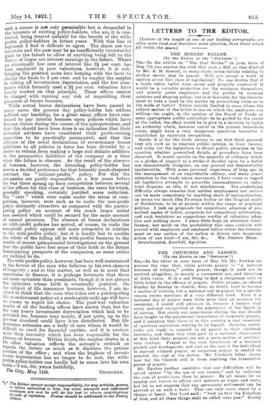LETTERS TO THE EDITOR.
[Letters of the length of one of our leading paragraphs are often more read,and therefore more effective, than those which fill treble the specs.] THE MINERS' BALLOT.
(To IRE EDITOR OF TELE " SPECTATOR.")
Sts,—In the article on " The Coal Strike" in your issue of May 7th you express the wish that such a Bill as that drafted by Mr. A. M. Samuel, to make trade union ballots relating to strikes secret, may be passed. Will you accept a word of caution about this class of legislation? No one doubts that if a trade union ballot were secret and properly conducted it would be a valuable protection for the workmen themselves, and greatly assist employers and the public in forming opinions and shaping policy, but is it desirable for the Govern- ment to take a hand in the matter by prescribing rules as to the mode of ballot? Unless strictly limited to cases where the subject matter of the ballot is one on which the employers are willing—(or ought, in the opinion of the Board of Trade or EOM appropriate public authority)—to be guided by the result of the ballot, the effect would be to give to a decision by ballot an authority which, however useful in the present immediate crisis, might have a very dangerous operation hereafter if established by statutory recognition.
Surely it is for the trade unions to see that their proceed- ings are such as to impress public opinion in their favour, and risky for the legislature to divert public attention to the question whether prescribed details of procedure have been observed. It would operate on the majority of ordinary minds as a pledge of support to a strike if decided upon by a ballot not demonstrably irregular, on any ground not demonstrably inadmissible. With some personal experience of long ago in the management of an unprofitable colliery, and many years' attention to the trade union movement, I have come to regard all legislative attempts to prescribe reasonableness in indus- trial disputes as idle, if not mischievous. The ,underlying difficulty always remains that neither employment nor service can be made compulsory by anything short of nationalization, on terms too much like Prussian kultur or the illogical shifts of Bolshevism, to be at present within the range of practical politics. I look on proposals for compulsory adoption of pre- scribed modes of ballot, proposals for compulsory arbitration, and such tentatives as suggestions worthy of voluntary adop- tion and nothing more. I place little hope on statutory inter- ference, but much on the probability that sane counsels will prevail with employers and employed before either the Govern- ment or any section of the nation is driven into desperate action of any kind.—I am, Sir, &c., Wm. PaIrson BEALE. Drumlamford, Barrhill, Ayrshire.


































 Previous page
Previous page